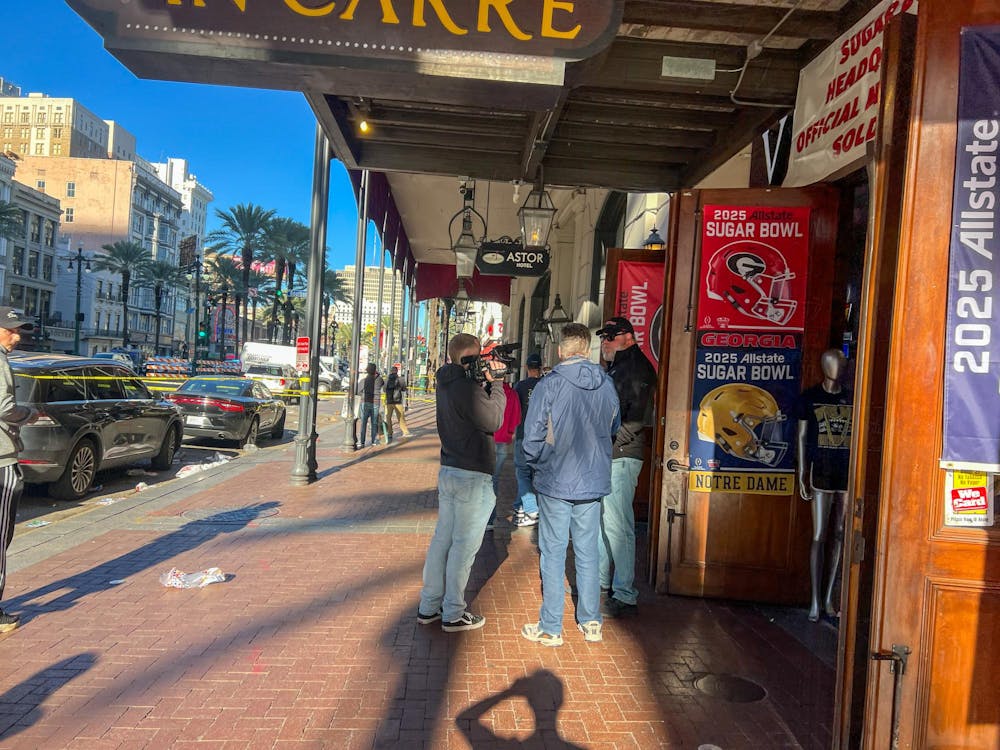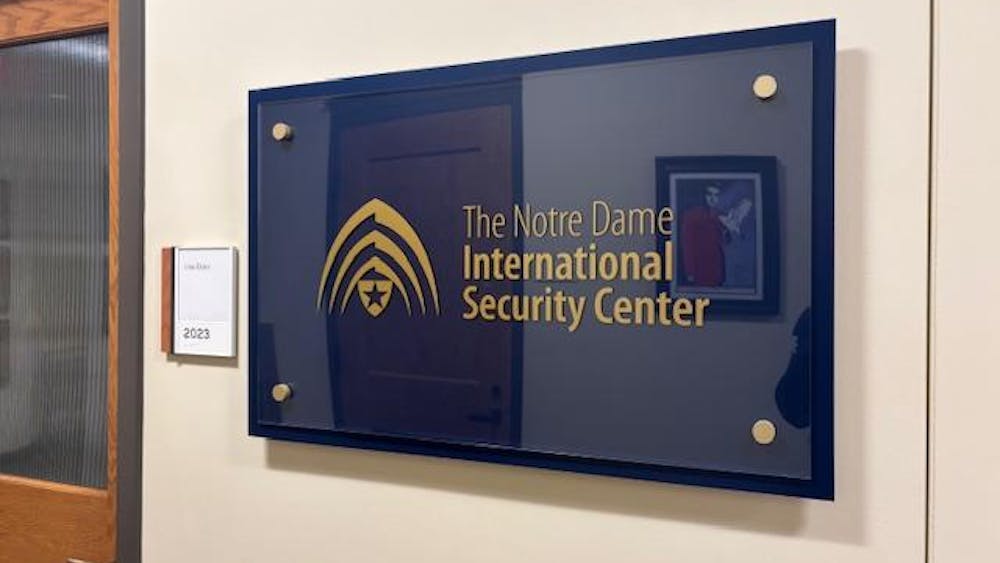Notre Dame students who traveled to New Orleans for the Sugar Bowl expected to ring in the new year with hope and excitement. Instead, they were met with fear and terror in the early hours of Jan. 1 when a terrorist drove a truck down Bourbon Street, killing 14 people and injuring 35. Although no Notre Dame students were injured or killed during the attack, many were in the area at the time.
Avery Pitstick, a senior in Breen-Phillips Hall, stayed at the Royal Sonesta on Bourbon Street, just outside where the perpetrator was ultimately killed by police after exchanging fire.
Pitstick said she returned to the hotel around 2 a.m. and was asleep when the attack occurred, but was awoken by her mom at 4 a.m. when an alarm went off in the hotel, telling residents to evacuate.
At first, Pitstick thought it was a fire alarm, but she realized things were more serious when she saw a law enforcement officer in the lobby of the hotel with a gun drawn. Officers then made Pitstick and other residents exit the back of the hotel via the valet exit and stand on the curb on a side street, before making them move again. Later, a bystander alerted her to what had happened.
“As we’re walking to this next location, this woman comes up to my mom and is like, sobbing, shaking. She's going, ‘I just saw dead people. I just saw it. There's blood everywhere,’” Pitstick recounted.
Pitstick said she and her family found another hotel to stay at after sitting on the curb for about an hour. They returned to get their belongings in the morning.
“It felt really surreal all day. It still feels kind of weird, like it doesn't feel like we were actually right there,” Pitstick said. “We just got so lucky that we were all in the hotel … I almost stayed out later that night, and I would have been right there probably when I was coming home.”
Olivia Klusas, a freshman in Pasquerilla West Hall from St. Louis, flew to New Orleans on the morning of New Year's Day. She was aware something had happened before boarding the plane, but didn’t know the full extent of the attack. She said she felt afraid from being bombarded with the information upon landing and having to piece everything together.
Lauren Wiltz, a freshman in Pasquerilla West Hall from Lafayette, Louisiana, began driving to the game on the morning of New Year’s Day with her family, despite already knowing the attack had occurred. She shared that her dad was hesitant to go, but her mom, who loves football, insisted they went.
“Around halfway there, we got the notification that the game was postponed, which I was pretty thankful for because I was kind of nervous,” Wiltz said.
Despite living near New Orleans, Wiltz was not immediately worried as she figured they would not have been on Bourbon Street at that time. She later found out, however, that one of the victims was a family friend who lived nearby. She said the area was extremely devastated by the loss.
“It was a couple days where people were just kind of somber, a lot of people cancelled their plans, there were services at local churches as well as efforts for the victims such as blood drives,” she said.
Stephanie Hernandez, a junior in Welsh Family Hall, who was on Bourbon Street shortly before the attack, was born and raised in New Orleans. She explained that because of this, she typically wouldn’t do tourist activities, but had a friend visiting who wanted to go to Bourbon Street.
“If it wasn’t this whole big crowd of Notre Dame people in New Orleans, I probably would have done something else, because when you live here, you know there’s something that happens on Bourbon Street on major holidays every single year,” Hernandez shared. “It’s just a place to avoid.”
Hernandez’s group was on Bourbon Street from midnight until around 3 a.m. and said everything was “completely fine.”
When they decided to leave, they went to their car, parked on Canal Street nearby. On the way back, she said, her friend wanted to return to Bourbon Street, but her brother said he had a bad feeling and insisted they keep walking on Royal Street, a nearby residential road.
“It’s crazy to think about if we had listened to my friend and been on Bourbon,” Hernandez added.
Hernandez estimated the attack happened while they stopped for food across from Bourbon Street, but she didn’t hear anything as they were inside. When they went to leave, Canal Street was closed, and she described seeing cars all over Bourbon Street and flashing lights everywhere.
“We didn’t think it was anything serious, because, again, when you’re from New Orleans, you’re used to it,” Hernandez said.
They began to hear what had happened from her brother’s spouse, who works at a hotel on Bourbon Street and called them on their way home.
“When we woke up, it was all over the news … on one hand, I wasn’t too freaked out, because again, this is something that unfortunately happens in New Orleans. At the same time, I was seeing it a lot more this time, with not only my hometown friends and family posting about it, but all of Notre Dame. I couldn't go anywhere or do anything without seeing updates, which really scared me,” Hernandez said.
Students said they noticed an increased security presence at the game.
“When we went into the city the next day, though, it was really comforting to be there, honestly, because I do know it from being young there, and I’ve never seen that much police protection in my life,” Wiltz said. “I think I saw more police than I saw people.”
Students expressed mixed feelings about the game being played at 3 p.m. the next day.
“I was really happy it got moved to the next day. I think that was a great decision,” Pitstick said.
Pitstick also said she appreciated how the tragedy of the previous morning’s events was memorialized at the game.
“We had the moment of silence beforehand, the football team ran out with the American flag, and then everyone was chanting USA after the Star Spangled Banner. It felt like people understood the gravity of what had happened,” she said.
Klusas said the game was somber and was impressed with the Sugar Bowl’s acknowledgement of what had happened and advertisement of initiatives to help the victims, including a blood drive.
“They made sure that what had happened was not forgotten,” she said.
Hernandez said many of her friends who had come for the game ended up leaving. She said she debated selling her ticket, but ultimately decided to go since she knew there would be heightened security.
On the quick turnaround from the terrorist attack to the game, Hernandez said, “it was weird. Everything was super uneasy and everyone was shaken up about the whole thing. I don’t think it’s completely right that they had this big football game the day after, but at least they took extra precaution and I understand rescheduling it further would have been hard.”










